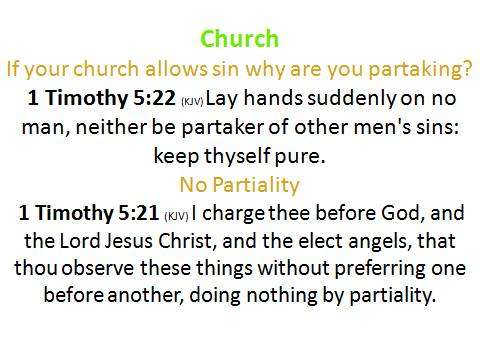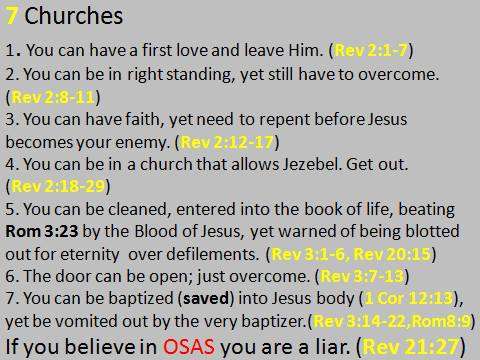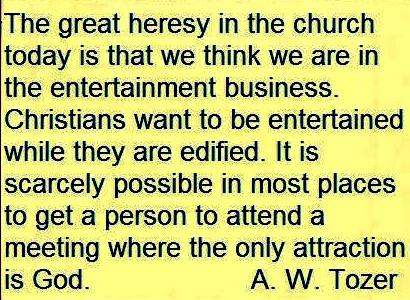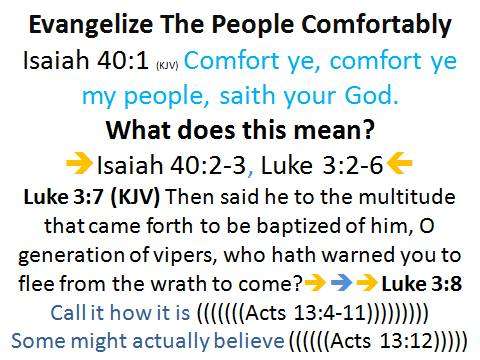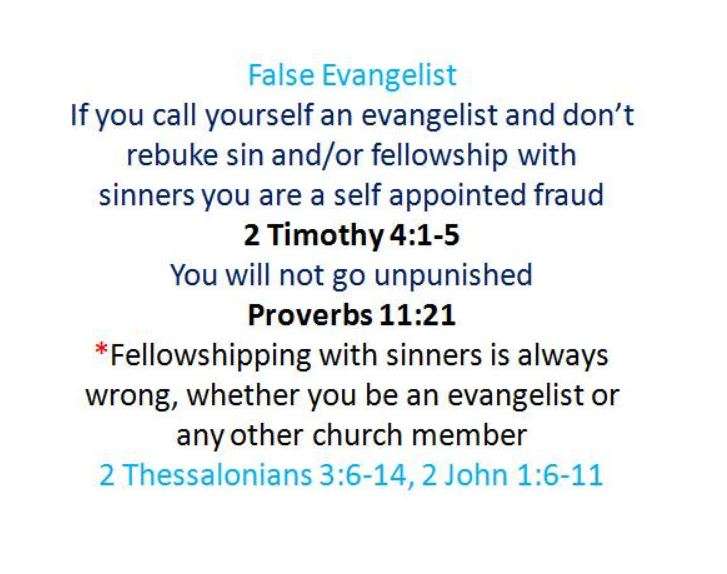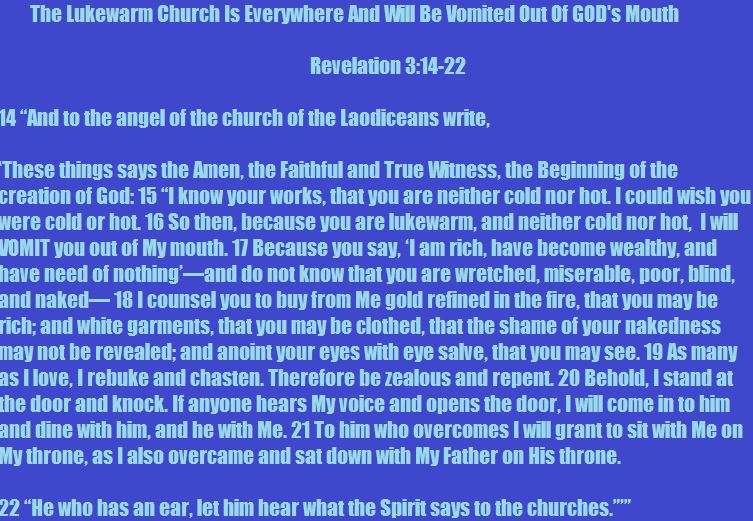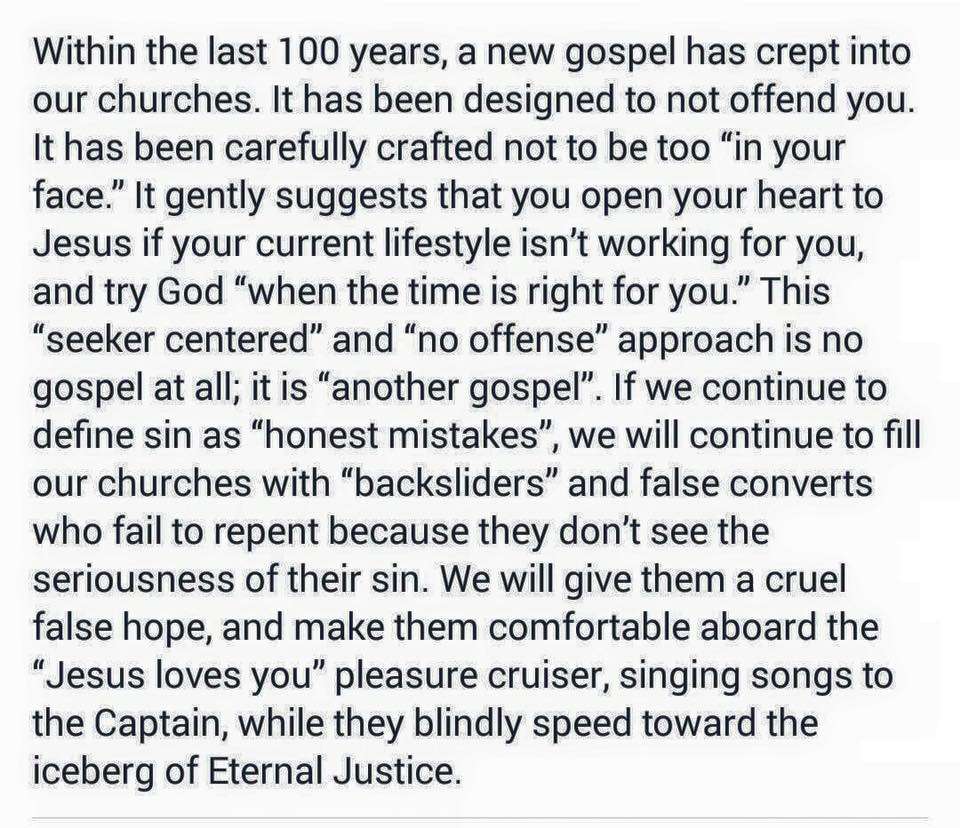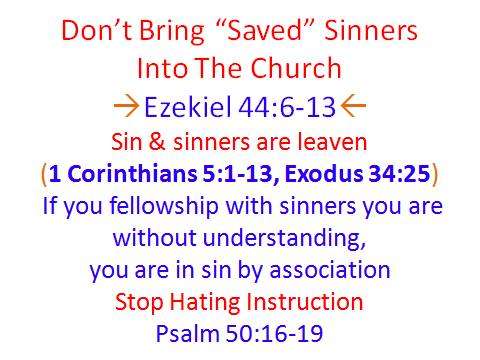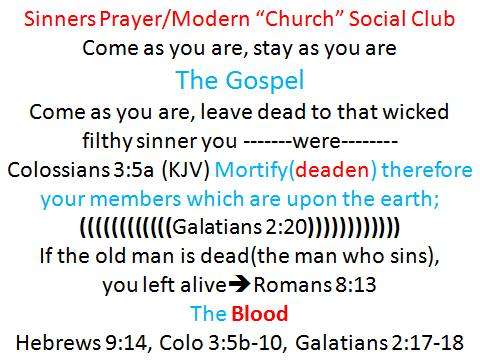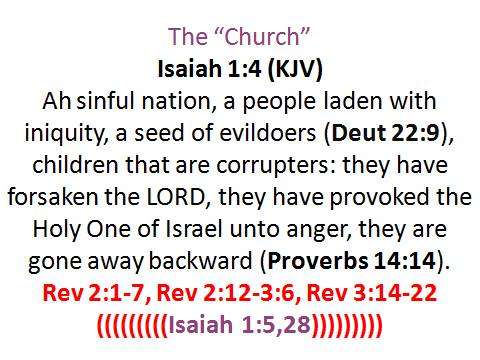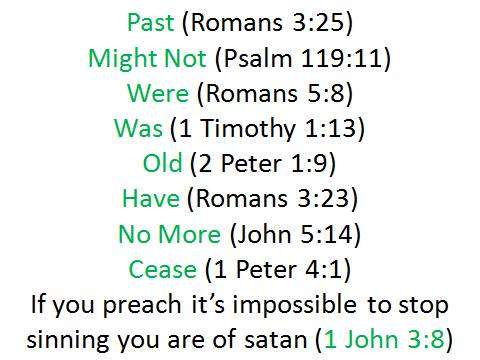
Church Rules & Discipline
A 2 PART AUDIO STUDY BELOW:
Church rules and discipline are necessary because the Church represents Christ and the church member’s represent the church (so the church members represent Christ then logically).
Bad character and conduct of church members will reflect poorly upon Christ and His testimony.
Church leaders need to discern the wicked who have no heart to conform to Christ’s will and therefore shouldn’t be part of the church versus the willing and obedient disciples who should be part of the church, even if they are weak and unlearned.
Proclaiming the whole counsel of God and expecting that people conform to the truth preached brings revelation of Christ’s will and in doing this it divides the wicked from those who are willing disciples. “For the word of God is quick, and powerful, and sharper than any twoedged sword, piercing even to the dividing asunder of soul and spirit, and of the joints and marrow, and is a discerner of the thoughts and intents of the heart.” (Hebrews 4:12)
Usually doing the above will cause the wicked who have no real heart to obey God’s Word to leave the church without needing to be excommunicated directly by the elders. But obviously excommunication is necessary for those who don’t leave yet have proven they are unwilling to do what God commands and be Christ’s disciples.
Allowing the wicked who have no heart to be discipled to remain in the church will hinder the true disciples, corrupt them, and keep them from being the pure testimony for Christ which they ought to be before the world.
Church meetings should primarily be about discipleship of the believer- not evangelism. Part of the discipleship of the believer is training for evangelism outside of the church meeting; and of course it’s not wrong to say things intended to bring visitors to the church and older youth to Christ. But devoting church meetings to evangelism keeps the believers from the instruction they need to mature in the faith.
And when regular members are not true disciples evangelizing these won’t help anyways- they consider themselves to be in Christ and they see evangelism as needful for others but not themselves. So trying to evangelize them week after week like you’d evangelize an outsider is pointless anyways.
A key characteristic of the New Covenant is that in the church (working as God intended it to be and maintaining His holy standards) the members do not need to be evangelized (i.e. told to know the Lord). “10 For this is the covenant that I will make with the house of Israel after those days, saith the Lord; I will put my laws into their mind, and write them in their hearts: and I will be to them a God, and they shall be to me a people: 11 And they shall not teach every man his neighbour, and every man his brother, saying, Know the Lord: for all shall know me, from the least to the greatest.12 For I will be merciful to their unrighteousness, and their sins and their iniquities will I remember no more.” (Hebrews 8:10-12)
One thing I appreciate about our Bible studies is that we can deal with topics that edify the believer’s understanding without needing to call people to repentance and salvation all of the time. Sure, I’ll mention truths that might be helpful in evangelism, will occasionally exhort people to repent if they’re not living in line with the truth that we’re dealing with, will generally mention the need for all to get ready to meet God- all of that is okay here and there; but the messages are prepared for the edification and instruction of the believers (particularly you who are the missionaries with GMFC). That is how a church meeting should basically be too.
And as the believers are edified you can build on that week after week and see a real edifying in the Lord that will overall increase the quality of the church as well as better draw people to the group for the right reasons. To my knowledge you are all doing that and seeing that type of edifying and increase already! Yet my point is that we don’t need to worry about missing a chance to evangelize an unbeliever because they’re not coming to the church meeting anymore. The best evangelistic testimony to give to someone in that case is to come back when they are ready to repent and submit to the whole counsel of God- because they’ll be secure in their sin anyways as long as they can keep coming back to church in their sin and thinking they have an interest in Christ as they do so. They NEED to have their false security rug pulled out from under them before they’ll really be challenged to repent anyways.
Notice Revelation 2:12-16: “12 And to the angel of the church in Pergamos write; These things saith he which hath the sharp sword with two edges; 13 I know thy works, and where thou dwellest, even where Satan’s seat is: and thou holdest fast my name, and hast not denied my faith, even in those days wherein Antipas was my faithful martyr, who was slain among you, where Satan dwelleth. 14 But I have a few things against thee, because thou hast there them that hold the doctrine of Balaam, who taught Balac to cast a stumblingblock before the children of Israel, to eat things sacrificed unto idols, and to commit fornication. 15 So hast thou also them that hold the doctrine of the Nicolaitanes, which thing I hate.”
Without getting into the specific false doctrines talked about here, the thing I’m seeking to emphasize is that the leading elder of the church (i.e. called the angel in Rev chapters 2 and 3) was rebuked simply for allowing those who were stumbling-blocks to God’s people to remain in the church. And allowing these to remain in the church is ALSO DANGEROUS FOR THEM as well. The lessons here apply to all churches.
“16 Repent; or else I will come unto thee quickly, and will fight against them with the sword of my mouth. 17 He that hath an ear, let him hear what the Spirit saith unto the churches…”
Never appoint a man to church offices without full trial and examination; or else you will be an accessory to, and accountable for, his misbehaviour in his office. Keep yourself pure from the blood of all men.
1Ti 5:22 “Lay hands suddenly on no man, neither be partaker of other men’s sins: keep thyself pure.”
Another powerful command below to keep “saved” sinners OUT of the church:
Eze 44:6 And thou shalt say to the rebellious, even to the house of Israel, Thus saith the Lord GOD; O ye house of Israel, let it suffice you of all your abominations,
Eze 44:7 In that ye have brought into my sanctuary strangers, uncircumcised in heart, and uncircumcised in flesh, to be in my sanctuary, to pollute it, even my house, when ye offer my bread, the fat and the blood, and they have broken my covenant because of all your abominations.
Eze 44:8 And ye have not kept the charge of mine holy things: but ye have set keepers of my charge in my sanctuary for yourselves.
Eze 44:9 Thus saith the Lord GOD; No stranger, uncircumcised in heart, nor uncircumcised in flesh, shall enter into my sanctuary, of any stranger that is among the children of Israel.
Eze 44:10 And the Levites that are gone away far from me, when Israel went astray, which went astray away from me after their idols; they shall even bear their iniquity.
Eze 44:11 Yet they shall be ministers in my sanctuary, having charge at the gates of the house, and ministering to the house: they shall slay the burnt offering and the sacrifice for the people, and they shall stand before them to minister unto them.
Eze 44:12 Because they ministered unto them before their idols, and caused the house of Israel to fall into iniquity; therefore have I lifted up mine hand against them, saith the Lord GOD, and they shall bear their iniquity.
Eze 44:13 And they shall not come near unto me, to do the office of a priest unto me, nor to come near to any of my holy things, in the most holy place: but they shall bear their shame, and their abominations which they have committed.
Yet another example:
Sexual Immorality Defiles the Church
1Co 5:1 It is reported commonly that there is fornication among you, and such fornication as is not so much as named among the Gentiles, that one should have his father’s wife.
1Co 5:2 And ye are puffed up, and have not rather mourned, that he that hath done this deed might be taken away from among you.
1Co 5:3 For I verily, as absent in body, but present in spirit, have judged already, as though I were present, concerning him that hath so done this deed,
1Co 5:4 In the name of our Lord Jesus Christ, when ye are gathered together, and my spirit, with the power of our Lord Jesus Christ,
1Co 5:5 To deliver such an one unto Satan for the destruction of the flesh, that the spirit may be saved in the day of the Lord Jesus.
1Co 5:6 Your glorying is not good. Know ye not that a little leaven leaveneth the whole lump?
1Co 5:7 Purge out therefore the old leaven, that ye may be a new lump, as ye are unleavened. For even Christ our passover is sacrificed for us:
1Co 5:8 Therefore let us keep the feast, not with old leaven, neither with the leaven of malice and wickedness; but with the unleavened bread of sincerity and truth.
1Co 5:9 I wrote unto you in an epistle not to company with fornicators:
1Co 5:10 Yet not altogether with the fornicators of this world, or with the covetous, or extortioners, or with idolaters; for then must ye needs go out of the world.
1Co 5:11 But now I have written unto you not to keep company, if any man that is called a brother be a fornicator, or covetous, or an idolater, or a railer, or a drunkard, or an extortioner; with such an one no not to eat.
1Co 5:12 For what have I to do to judge them also that are without? do not ye judge them that are within?
1Co 5:13 But them that are without God judgeth. Therefore put away from among yourselves that wicked person.
Do not have partiality.
1Ti 5:21 “I charge thee before God, and the Lord Jesus Christ, and the elect angels, that thou observe these things without preferring one before another, doing nothing by partiality.”
And this does not only pertain to the fellowship/church. You are to separate from sinners:
2Jn 1:10 “If there come any unto you, and bring not this doctrine, receive him not into your house, neither bid him God speed:
2Jn 1:11 For he that biddeth him God speed is partaker of his evil deeds. “
Christian, you are the temple of the Living God! Are you going against the clear commands of the bible and yoking with and condoning sinners?
2Co 6:14 “Be ye not unequally yoked together with unbelievers: for what fellowship hath righteousness with unrighteousness? and what communion hath light with darkness?
2Co 6:15 And what concord hath Christ with Belial? or what part hath he that believeth with an infidel?
2Co 6:16 And what agreement hath the temple of God with idols? for ye are the temple of the living God; as God hath said, I will dwell in them, and walk in them; and I will be their God, and they shall be my people.
2Co 6:17 Wherefore come out from among them, and be ye separate, saith the Lord, and touch not the unclean thing; and I will receive you,
2Co 6:18 And will be a Father unto you, and ye shall be my sons and daughters, saith the Lord Almighty.”
Rom 1:32 “Who knowing the judgment of God, that they which commit such things are worthy of death, not only do the same, but have pleasure in them that do them.”
QUESTIONS ANSWERED
I have a few questions concerning how some issues should be addressed in church. Some few questions from the youth fellowship.
1. Can a girl or boy in church Mary from outside church?, let’s say marrying from denominations that don’t believe like us?
It would depend on whether the person from the denomination was willing to align with the Bible when shown better about where their beliefs are in error. That would necessarily mean they’d have to leave their denomination that was in error and join the fellowship of the one they’re marrying in order to walk in the light that they have now received. Part of your job as the head elder in your fellowship would be to show them their error and give them the right Biblical understanding. The member of your fellowship interested in marriage should be willing to bring their potential partner (and the potential partner’s parents if they’re still alive and willing to come) to you in order to understand your church’s beliefs and understand why you could not give your blessing on the marriage if the new couple were to declare that they’d attend the denominational church instead.
2. What age is advisable for a youth in church to marry?
There is no magical age where one is suddenly ready to marry. The advisable age depends on a lot of things. Examples: What is the minimum marriage according to your national and local laws? (Remember Romans 13:1-7) If this statement I found is truly the law like it’s being claimed, then no one should marry in Kenya before 18. “In March 2014, the parliament adopted the Marriage Act 2014 which introduces a uniform minimum age of marriage, set at 18 for both women and men.Importantly, the new legislation applies to all forms of marriage including Islamic and customary marriages.” Also: Would the young age of the bride or groom, or the age difference between the bride and groom, be an obviously/no doubt about it bad testimony to the people around you (remember that love behaves not itself unseemly or indecently? Are both the bride and groom responsible and mature enough to understand and fulfill the duties, responsibilities, etc and handle the inconveniences, etc that marriage is likely to bring? Has there been appropriate parental permission granted? (those who are still living with their parents should have their permission and a parents’ “no” should not be disregarded unless it’s obviously because of their hostility towards Christ and not wanting their son or daughter to be involved in a Biblical Christian marriage) Do you as their Overseer see another solid reason why you should not bless it that is beyond just your opinion?
3. Is it biblically compulsory for a young man to pay dowry for him to marry? In Kenya here dowry is really considered a must in most tribes.
No, dowries are not only not compulsory to be paid; they are actually compulsory to not be demanded. Demanding this is an abominable cultural practice that goes against the biblical attitude for entering a marriage. This is an instance where culture must be disregarded in order to please God. If one or both sets of parents want to give a gift to the new couple or to the other family that is fine, but it’s sin for one person or family to demand this.
4. Are arranged marriages still applicable in church today. Like it was done in the old testament?
No, I really don’t think so. And the reason is that our circumstances today are not like they were in the circumstances of the arranged marriages in the Old Testament.
5. Is a joint bank account advised for a couple?
If two people are faithful Christian church members, they certainly would be advisable! If they weren’t advisable it would certainly mean at least one of the two was not a faithful, trustworthy Christian and therefore ought not to be a church member. I suppose there could be circumstances where even a faithful might protect their money by having separate accounts because they thought the accounts were in great danger of getting unrighteously seized. Separate accounts could save some of the money if such a crime should occur against one of the accounts.
6. Can a boy or girl who ignores church rules and goes ahead to marry a unbeliever outside the church be excommunicated from the church?
Absolutely! This would be as appropriate a time as ever to excommunicate someone.
Now a few questions that I have come across during my one on one house to house fellowships.
1. Is family planning (contraception) biblical? Say like one bears two children then she goes for an operation in order to stop her from giving birth to more children?
It would depend on why it was done. Inability to financially provide for anymore children would be a valid reason; and health problems in the woman could be a valid reason. But an operation would mean she could never bear children ever again. That may not be wise since perhaps the family could be in a better place financially another day or the woman’s health could improve before she was past child bearing age. It may be wise to research and attempt natural contraception methods that also don’t kill involve killing an already conceived fetus before going to the extreme of an operation. Sadly, in America many, many, many people use contraception even though they could afford to have more children and also the mother’s health wouldn’t be greatly endangered to have more children. And even worse, oftentimes they use contraception methods that kill an already conceived fetus; or they have an abortion well after the conception. Very evil.
2. How can we do our weddings in church? What is a biblical order? What are the important measures that should be taken before we as church overseers allow any wedding or marriage ceremony to take place?
You certainly don’t want anyone going broke over paying for the wedding. You also need to give a testimony that your ultimate hope is in heaven where Christ is and that the affections of the church members are therefore not set on the things of the earth (Colossians 3:1-4, 1 John 2:15-17). So no one in the church should have a showy, very expensive wedding even if they can afford to do so easily. Regarding how to do the wedding, I don’t see any definite directions in Scripture besides the need to have a holy, sober environment and for the Word of God to be proclaimed. Regarding the holy, sober environment of course there should be no alcohol served. The guests should be considered carefully. People who are known to disrupt and make trouble probably shouldn’t be invited at all; perhaps they could be warned ahead of time that there will be zero tolerance for rowdiness or fighting if they were very close relatives. Same for people known to dress immodestly- you could give a dress code ahead of time and make it clear that those violating it won’t be allowed in, no matter who they are. You sure don’t want to have many more adult non-Christians than faithful, holy church members. That’s a recipe for trouble. You’d need to consult with the families about the guest lists, the seating arrangements, the meeting arrangement, the reception activities, etc. It’s good to give them freedom within the realm of holiness and sobriety; but you have the right to step in and say such and such simply cannot be done here (such as dancing or games that could promote immodesty or rowdiness). You’d want to consider the guests and the couple’s wishes about whether an evangelistic sermon would be appropriate (Christ seeks a holy bride and won’t settle for less is always a great topic at a wedding) or perhaps testimonies from the couple and/or other church members that might be more to encourage the believers and just be an overall testimony of God’s goodness. Yet ultimately if you think something particular needs to be said, you have the right to fit it in somehow. Regarding singing: Worship from the believers is always great; but you also don’t want to encourage the wicked in attendance (if there are any in attendance) to be praising God and thinking their part of the believers as they sing to God in their unrighteous state- Proverbs 15:8-9. So you might do well to choose songs to sing that only the church members know or have church members go up front and sing before everyone else (not usually good to do- but weddings and funerals can be exceptions due to the circumstances).
3. In Kenya we have three types of marriages. Which one among these suits us as being true Christians?
A. Customary(No certificate issued. Only agreement put down on a piece of paper between the two sides of elders.
B. Religious (certificate issued by a licensed religious leader.
C. Civil (certificate issued by an authorized government officer.
You want to make sure you are blameless according to the law. And you also have to make sure that yourself and the other elders don’t compromise truth in order to be a licensed religious leader- but if you don’t need to compromise or spend lots of money to be licensed religious leaders, that would probably be the best way to go. Otherwise the license issued by an authorized government officer should ensure you are all blameless in going about this.
4. Can a single brother/sister in church who separated with his /her spouse who is outside church remarry? This separation happened before the one in church got saved. And let’s say the spouse outside the church is married to someone else. How should we handle Case 1. Where the person in church is remains single but the spouse who is outside church is married to another. Advice on both cases about
-the single person in church but is legally divorced according to Kenyan laws.
-And the one who is not legally divorced according to Kenyan laws.
All these their former spouses are married to other people.
After seeing your clarification, this is not hard. This is one of the key issues regarding the importance of the fact that Jesus didn’t correct the Law of Moses. Many abuse Jesus’ words to say no divorce and remarriage ever as long as the other partner lives. But since we know we ought to interpret Jesus in consideration of what Moses said (which was really Jesus speaking through Moses) we know that Jesus only forbid remarriage when the divorce was not initiated for a righteous reason. And obviously even if it wasn’t initiated for a righteous reason, if the other person has remarried then nothing can be done to heal the unrighteous divorce anyways. All a person can do in that case is repent in godly sorrow and do things God’s way going forward. If the divorce is final according to the law and the other person is remarried, then the church member is free to remarry. They are also free to remarry if they had to put way their previous spouse because of moral uncleanness/sexual sin or if their former spouse put them away due to their testimony of Christ- even if the other former spouse has not remarried they are STILL free to remarry in such cases. But in such a case you still need to protect those in your church who have never married before from possibly getting into a marriage with someone whose past could affect their present somehow. It’s always important with every potential marriage to make sure that people understand what they are getting into as much as it’s possible to help them understand that; and also to make sure that no one is manipulating or pressuring them somehow to enter into the marriage. And making sure of those things is primarily your responsibility as their Overseer.
The church(ecclesia) is the entire body of Christ, worldwide. It has only one Head who is Christ Jesus, and, it has only one headquarters – the third heaven. In the body of Christ and every member has a function (Eph. 4:16). While some members may have a more important or visible ministry than others, each and every member has something valuable to contribute as they “work together”. It’s not about wicked denominations made by men.
Christ has given to His church apostles, prophets, evangelists, shepherds and teachers to build His body (Eph. 4:11). These are ministries and not titles. Apostles were used by Jesus to build the early church and although there may be be few “apostle like” people in the world today, we would greatly caution calling anyone an apostle today. They have the first place in the church (1 Cor. 12:28) and are thus elders to the elders of the churches within their sphere (2 Cor.10:13). We believe bishop is a better term but again, we refrain from most titles as we are simple humble servants. Prophets are those who uncover and minister to the hidden needs of God’s people. Evangelists are those who are gifted to ministers non-Christians to Christ and to bring them into the church after repentance. They must then bring these repentant converts into the local church, which is Christ’s body. (Here is where a lot of modern evangelism fails). Shepherds are those who care for and guide the young lambs and sheep. Teachers are those who can explain the Scriptures and its doctrines. These five gifts are for the church worldwide; and from among them, shepherds and prophets are the strength of every local church. The other three gifts can be itinerant (from other localities).
The leadership of the local church should be in the hands of elders as the New Testament clearly teaches this (Titus 1:5; Acts 14:23). `Elders’, being plural, implies that there must be at least two in every church. This provides a balance in the leadership of the local church and also for binding the activities of Satan through the power of the Lord’s presence (Mt 18:18-20). A “one-man leader” of a church is contrary to the teaching of the New Testament. One among the elders may however be the `messenger of the church’ (Rev 2:1), if he is gifted with the Word. All believers in a local church must be subject to the authority of the elders of that church in all matters related to the local church (Heb 13:17; 1 Thess 5:12,13).
IMPORTANT: Jesus preached against some titles (Matt. 23:7-12). It is against the humble calling of a servant to be called Rabbi, Father or Reverend. The title of `Reverend’, in fact, is used only for God in the Bible (Psalm 111:9) and that is sinful if one is called “reverend” or “Rabbi” or “Father”. Everyone in the church, great or small is best to be called just a brother and a servant. “Pastor” is one of the most misused words in the entire Bible! The word “pastor” means “shepherd.” The Lord’s church is often described in the Bible as the flock of God
(Acts 20:28; 1 Peter 5:1-4). According to the Bible, pastors (shepherds) are the elders or overseers of the church (See Acts 20:17, 28; Ephesians 4:11; Philippians 1:1; 1 Peter 5:1-4). It is God’s pattern for His church that each congregation will have overseers or shepherds who meet the special qualifications which He has given in His Word (Acts 14:23; 1 Timothy 3:1-7; Titus 1:5-9). There must be two or more pastors (elders, shepherds, overseers) for they are always plural when mentioned as leading a congregation (see Acts 14:23; Philippians 1:1; etc.). Jesus said of His disciples: All ye are brethren.
It is sinful for a Christian to exalt himself above his fellow Christians by wearing special clothing to set himself apart from them. It is sinful for a Christian to insist he be called by some special title such as “Pastor”, “Leader”, etc to be puffed up or to be treated with reverence. It is wrong for workers in the church to insist that special seats be reserved for them or that they be given special greetings different than the others. God is our Father. All Christians are brothers and sisters in Jesus Christ, servants together of the Most High. Let us honor God(Jesus) as our heavenly Father and Teacher. Let us humbly serve Him and take no pride in wearing man-made titles to exalt ourselves. Let us always remember Jesus’ warning: And whosoever shall exalt himself shall be humbled; and whosoever shall humble himself shall be exalted
(Matthew 23:12).
The church is to have meetings for teaching (Acts 20:9,11), prayer (Acts 12:5,12), evangelism (Acts 2:14-40) and also for mutual encouragement (Heb.3:13 – where believers who are gifted with the Word can encourage one another – 1 Cor. 14:26-40). Here you can read about the Lord’s Day, Sunday. We are however to live holy and do HIS will each and every day. The gift of prophecy (the word here does not mean foretelling things to come; but rather opening and applying the scripture), teaching, must be desired by all who want to exercise it in the meetings (1 Cor. 14:1,39). Tongues (the gift of speaking in a foreign language) are explained here and are very rare. The heretical pentecostal / charismatic babbling is of the devil as are their false “signs and wonders“.
Women are permitted to pray and prophesy with their heads veiled in the meetings(1 Cor.11:5) and anytime they are in public, but please note, it was very rare and they were inspired to prophesy. The bible clearly states 1 Co 14:34 “Let your women keep silence in the churches: for it is not permitted unto them to speak; but they are commanded to be under obedience, as also saith the law”, women are to remain silent in the church. The apostle Paul has expressly forbidden their becoming public teachers; (1 Ti 2:12). In any case, they are not permitted to exercise authority over men or to teach.
The veiling on a woman’s head (taught in 1 Cor. 11:1-16) is meant to symbolize:
That the glory of man is to be covered in the church (“woman is the glory of man “- v. 7) and that she is submissive to the authority of the man (v. 10) – whether husband, father or elder. A woman is to veilled physically veiled anytime she is in public.
Women must demonstrate the purity of Christ in the way they dress and act – they must dress modestly and discreetly (1 Tim. 2:9) and head covering as taught here. A complete teaching here on the Women’s role in Christianity.
The church also has a responsibility to preach the good news by all means possible, to all whom it can reach, with the aim of making disciples of Christ in all nations (Mk. 16:15 with Matt. 28:19). Evangelism without disciple-making, however, is not the will of God, and is a hindrance to the testimony of Christ on earth. All Christians are to witness to others in word & deed.
Every local church must also proclaim the Lord’s death through the `breaking of bread’ (1 Cor. 11:22-34). This was not a fellowship meal, it was after they “supped”(after supper), it was distinct to honor the Lord. The frequency of this testimony is a matter on which the Word of God gives freedom to each church. It must not be forsaken completely or turn into an empty ritual.
Regarding offerings, all giving by believers must be voluntary, secret and cheerful (Matt.6:3; 2 Cor.9:7) and it’s used for the poor (and to help the “least of these our brethren” in need). So the best way is to keep a box somewhere in a meeting place where those who want to give can give without being observed. It is wrong to keep a record of giving, like on paper or in a computer or to send reports of the work to others with the intention of obtaining money from them (even if such reports are called `prayer letters’). Jesus and the apostles never did this.
A local church can be in right standing with God only as it leads disciples to the obedience of faith – obedience to all of Jesus’ commands. The smallest to the greatest of the commandments in the New Testament must also be obeyed and proclaimed with zeal. This is what makes a person great in God’s eyes (Matt. 5:19). “Least in the Kingdom of Heaven” means one ends up in hell. Don’t be a Revelation 3:16 lukewarm “Christian” lest you be spewed out.
CLICK HERE TO READ A GREAT STUDY ON WHAT A TRUE 1ST CENTURY BIBLICAL CHURCH LOOKED LIKE

